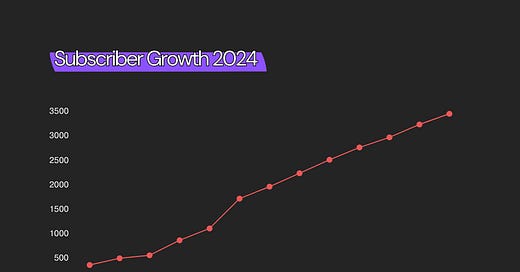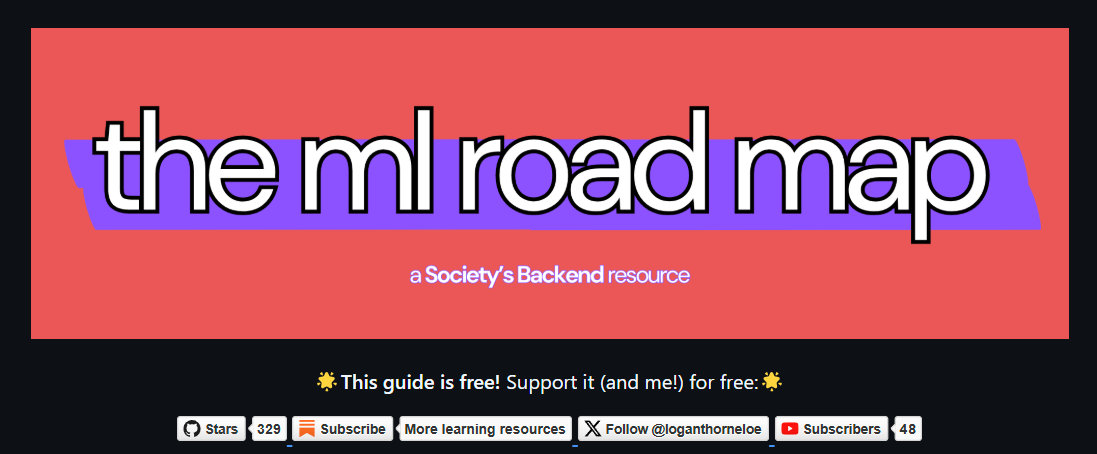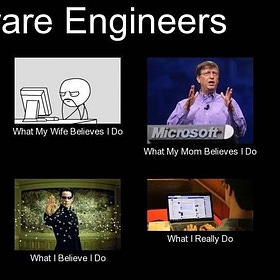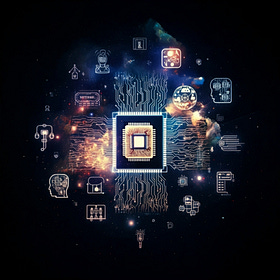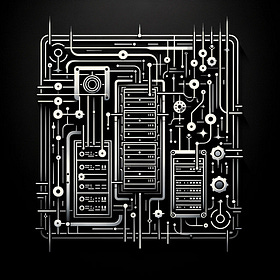On December 30th, 2023, Society’s Backend was 345 members strong. We’re now sitting at 3,445. In 2024, Society’s Backend gained over 3000 members. Thank you so much for your support this year. It means a lot to me that you want my writing directly in your inbox each week.
I’m especially appreciative of the paid subscribers that support Society’s Backend. It means the world to me that you value my work enough to pay for it.
In 2025, I plan to be more organized about the topics I cover, dabble in video and audio, and continue to help you all understand AI engineering and what it means for you.
I’m so glad I decided to share my knowledge and the things I learn here on Substack. I’ve found my audience to be largely software engineers wanting to understand AI which is incredibly meaningful to me because that was me 5 years ago.
I didn’t realize it when I started writing, but this audience makes sense. I strongly believe everyone should understand AI because it’ll fundamentally change life for all of us. But this is especially true for those who will be building it. Rapid AI development has left engineers scrambling to understand it and I’m glad I can be a resource for them. That being said, I’ll continue to write my articles in a way that is understandable for all audiences.
Again, thank you so much for your support. I’m excited to write more in 2025.
Here are my favorite highlights of 2024:
1. The Machine Learning Road Map
I created a road map so anyone can understand machine learning fundamentals for free from high-quality resources. This road map walks you through the math and programming needed to train models and includes resources to advanced topics for further exploration. The road map has been starred 329 times on GitHub. If you want to understand machine learning, check it out at mlroadmap.io.
2. Devin Has Exposed a Major Issue with Software Engineering
This was one of my favorite articles to write this year because software engineers were freaking out about AI instead of celebrating a major milestone within AI that helps us. Too often do software engineers forget that our job is to solve problems NOT to code. Coding is just a means for solving problems, ensuring those problems are solved is that actual job. Really what AI has proven is it can free up time to allow us to solve those problems while it assists us by coding. You can check out the full article here:
Devin Has Exposed a Major Issue with Software Engineering
Cognition Labs recently released the first AI software engineer and it has caused developers to fear their job security. I've even seen posts on X about high schoolers changing their major for college just because of Devin. I understand the fear here, based on the general fear regarding AI taking jobs and
As an aside, this is why all software engineers need to learn ML. ML is THE tool to solve complex problems and it needs to be in a software engineer’s toolkit.
3. Collaborating with 10 Other AI Professionals to Help Others Understand What It Means to Work in AI
This was an awesome article where I posed a few simple questions to other AI professionals about their day-to-day work and qualifications for their job. I learned a lot from my collaborators and it was helpful for readers. Check this one out here:
What it's Like to Work in AI and Advice from 10 AI Professionals
The number one question I get when chatting with others about AI is: “How can I get involved with AI?” To answer this question, I’ve posed 4 questions to 9 people I know excelling in the realm of AI:
4. I Had My First Article Break 100 Likes
I wrote an article about machine learning infrastructure at the end of 2023. That article hit over 100 likes in 2024. I work in machine learning infrastructure and like to write about it. Seeing the interest in this article was awesome. Check it out here:
Machine Learning Infrastructure: The Bridge Between Software Engineering and AI
Due to popular demand, here's an overview of machine learning infrastructure (ML infra). The aim of this article isn't to delve into the complexities of ML infra but to provide a straightforward overview, highlighting the differences between machine learning infrastructure and typical software systems. My goal is to make this understandable for all read…
5. Weekly AI Reading Lists
I’m not sure how many of these I’ve written, but I maintained a cadence of one per week. These reading lists are how I keep up with AI developments and continue learning so I figured I’d share them all with you. I go through hundreds of AI resources each week and share the top 10 for free subs and top ~50 for paid. I’ve created a tab within the newsletter website to keep a list of these as I send them out. Check it out here.
Those are my favorite highlights from this past year. Thank you so much for joining me. I look forward to 2025!
If you’d like to support Society’s Backend, you can do so for $1/mo for the first year. You can also support me for free by subscribing and sharing any articles you find helpful. 🙂
As always, my DMs are open. I wish you the best 2025!
Always be (machine) learning,
Logan

